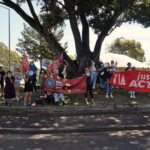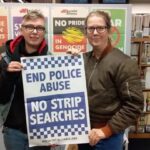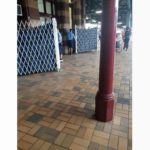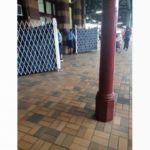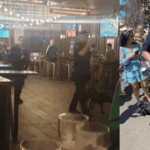Strip Searches: Minns Probes Whether Sexual Assault by the State Is Right for Kids
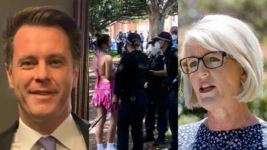
Redfern Legal Centre released figures on 17 October, outlining how many children – 10- to 17-year-olds – NSW police officers have strip searched over the 24 months to June this year, which revealed that 107 kids had been made to strip off in front of officers, including 3 girls aged 12 and 6 aged 13.
Indeed, the number of girls who’d been made to completely disrobe in front of two armed adults over the last 12 months has risen by 30 percent.
NSW premier Chris Minns, however, continued his textbook impersonation of previous Coalition premiers, when, a day later, he defended the long critiqued and poorly understood NSW police strip search protocols, arguing that all the other states do the same so why not the premier state.
Meanwhile, NSW agriculture minister Tara Moriarty spoke on behalf of the NSW police minister, as she told the state upper house last week that Yasmin Catley “is planning to meet with key stakeholders in the coming weeks to probe whether the policy settings in place are fit for purpose”.
Catley’s pledge to investigate NSW police use of strip searches was delivered during a debate over whether “subjecting children to strip searches is harmful”, and in parliamentary code, it amounts to saying, “things are going to stay the same”.
Yet, the horrific truth is three-quarters of strip searches turn up no illegal drugs, and circumstances that would warrant 12-year-olds having to disrobe immediately are obscure, so it’s difficult to see why police are subjecting kids to a practice said to be akin to sexual assault by the state.
Major support for child abuse
On the day after Redfern Legal Centre released the figures it acquired via freedom of information laws, NSW Legalise Cannabis MLC Jeremy Buckingham raised an 18th October motion, calling on the state government “to ban child strip searches for suspected drug possession”.
Buckingham quoted some established facts: academics have found that ordering kids to strip “may cause long-term harm”, that this practice that was meant to be employed in special circumstances has become routine, and a third of searches don’t reach “privacy and dignity” standards.
“The fact that children are being strip searched on our streets in this day and age is absolutely appalling,” the Legalise Cannabis member told parliament, adding that he could only imagine the effect such treatment at a train station by police officers would have on his own stepdaughter.
But this has been the ever-increasing reality for those living in NSW over recent decades, as despite the Ombudsman having called out the redundancy of sniffer dog use in 2006, officers have gradually accompanied an unsuccessful initial pat down following a dog indication with a backup strip down.
Yet, when this fairly simple proposition was put to the NSW upper house, most MLCs voted against banning strip searching kids.
Those who supported the ban consisted of Buckingham, Greens MLCs Abigail Boyd, Cate Faehrmann, Sue Higginson and Dr Amanda Cohn, along with Animal Justice Party MLC Emma Hurst and Liberal Democrat upper house member John Ruddick.
Writing its own law
The NSW Police Force has been resisting statewide pressure to reform its use of strip searches and the laws surrounding the practice for about a decade now. But as recent figures once again reveal, reliance upon this traumatic and flawed procedure has only been growing.
The RLC-commissioned UNSW strip search report of 2019 outlines that NSW police had increased its use of strip searches twentyfold between the years 2006 to 2018.
And authors Dr Michael Grewcock and Dr Vicki Sentas found that over 2017-18, 30 percent of such searches resulted in charges laid, 82 percent of which were for drug possession, meaning the person had a small amount of an illicit substance on them that was for personal use.
Part 4 division 4 of the Law Enforcement (Powers and Responsibilities) Act 2002 (NSW) (the LEPRA) contains the laws that pertain to the NSW Police Force use of strip searches.
Section 31 of the LEPRA reveals that most strip searches are of a dubious nature, as if they’re not carried out at a police station, the officer must consider that “the seriousness and urgency of the circumstances” necessitate an immediate search, and personal drug possession hardly ticks this box.
The privacy and dignity provisions set out in section 32, which officers don’t comply with during two-thirds of all searches, include no touching of the genital area or breasts, officers of the same sex must carry out the procedure and that the subject must be informed of why the search is necessary.
Some of the rules laid out in section 33 of the LEPRA include no searching of body cavities or touching of the body, that the search is done in a private area out of the sight of the public and that people under 18 who are searched must have a parent, guardian or representative present.
Section 34 of the LEPRA maintains that no one under that age of 10 can be strip searched by officers.
However, when civil society was breathing down its neck about this issue in 2019, NSW police released its person search manual, which revealed that although they don’t appear in the LEPRA, state law enforcement is applying a few extra measures that it’s sanctioned itself.
The manual, which has since disappeared from the web, set out that officers were allowed to order a person to lift testicles, part buttock cheeks, spread fingers and toes, lift breasts, turn their body to face in a different direction and squat.
All these additional measures were readily occurring in the field and subsequently being complained about, especially squatting and coughing, as they don’t appear in the laws regarding strip searches laid out in the legislation.
Akin to sexual assault
Renowned Australian abolitionist Amanda George argued in a 1993 article that strip searches are akin to sexual assault by the state. George stated this in relation to their use on women prisoners in the Victorian prison system, which is a practice that continues right across the continent.
RMIT criminology and justice studies lecturer Dr Peta Malins told Sydney Criminal Lawyers in 2019 that the research she’d been conducting revealed that police use of strip searches retraumatises survivors of past sexual assaults, while the procedure has a traumatising effect in general.
Around the same time Malins made these remarks, NSW police had just commenced using strip search screens at Sydney’s Central Station, so that commuters indicated by a sniffer dog, could be discretely taken behind the barrier and made to strip off on their way home from work.
Yet, despite the calls coming from civil society, the NSW state government and the NSW Police Force have consistently rebuked suggestions that having armed officers ordering civilians to strip off when they’re out in public to ascertain if they might have a tiny quantity of drugs on them isn’t right.
So, while the minister is off pondering whether adult officers ordering kids as young as 10 to strip off might be problematic in general, as well as personally traumatising for a child, it seems like an apt time to recall her predecessor’s remarks.
In November 2019, which was the last time this issue was garnering so much public attention, then NSW police minister David Elliott said, “I’ve got young children and if I thought the police felt they were at risk of doing something wrong I’d want them strip-searched.”
And let’s face it, while Elliott might have been a Coalition minister and Catley is the Labor minister for police, these days, the difference of opinion between both major parties in NSW, especially when it comes to law enforcement matters, is next to zero.


